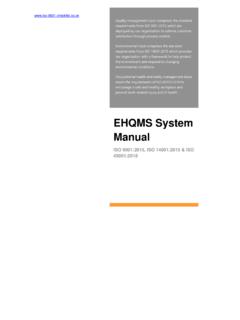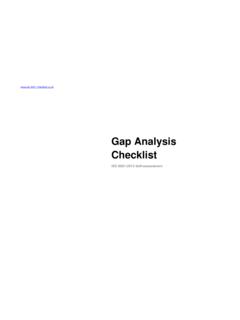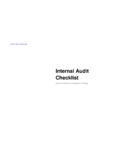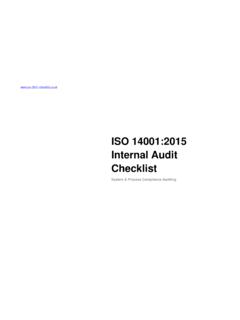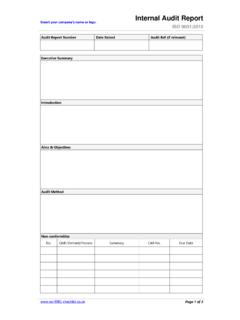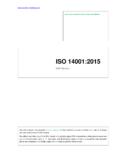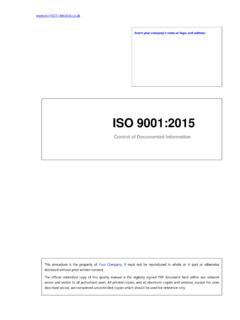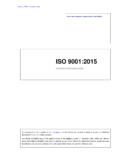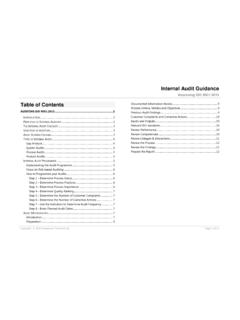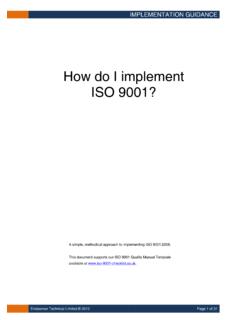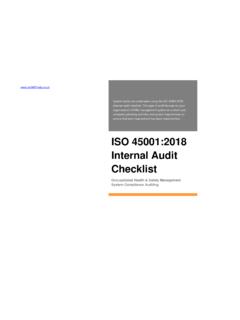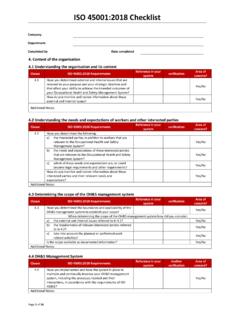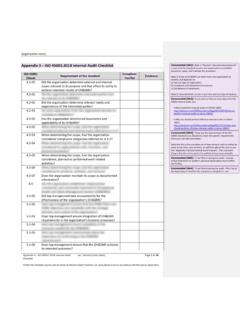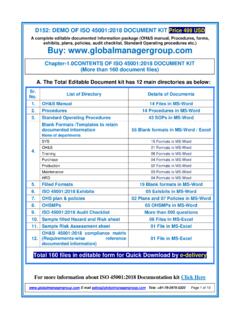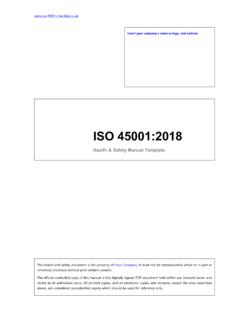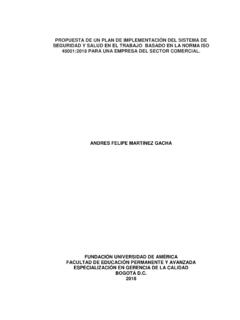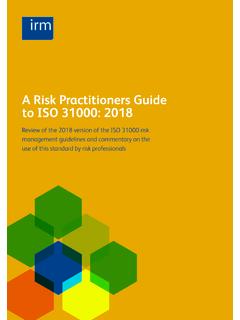Transcription of ISO 45001 2018 Gap Analysis Checklist Sample
1 Gap Analysis Checklist & Transition Guide OHSAS 18001:2007 to ISO 45001 : 2018 Insert your company s name or logo. Gap Analysis Checklist & Transition Guide OHSAS 18001:2007 to ISO 45001 : 2018 Page 2 of 18 Introduction Although the introduction of ISO 45001 : 2018 brings a new standard into effect, most of its basic principles are already formulated in OHSAS 18001:2007. The new standard encompasses common occupational safety requirements for management, employees and service providers, including the specific requirements relating to the respective work environment and changes to these requirements. The focal points of the new requirements to interpret and implement are: 1. Context of the organization; 2. Interested parties; 3. Hazard identification; 4. Assessment of OH&S risks and other risks to the OH&S management system; 5.
2 Assessment of OH&S opportunities and other opportunities for the OH&S management system; 6. Eliminating hazards and reducing OH 7. Management of change; 8. Procurement General; 9. Contractors; 10. Outsourcing. The degree of change necessary will be dependent upon the maturity and effectiveness of your current management system, organizational structure and operational practices. Therefore, a gap Analysis of the new requirements is strongly recommended in order to identify realistic resource and time implications. Organizations using OHSAS 18001:2007 are recommended to take the following actions: 1. Obtain a copy of ISO 45001 : 2018 - ; 2. Train internal auditors and other key personnel on new standard; 3. Using this document, undertake a gap Analysis of the new requirements against the current management system; 4. Develop an implementation plan to fill the gaps that you identified; 5.
3 Align your documentation and processes with ISO 45001 requirements; 6. Update your OH&S policy, objectives, targets and KPIs; Insert your company s name or logo. Gap Analysis Checklist & Transition Guide OHSAS 18001:2007 to ISO 45001 : 2018 Page 4 of 18 Gap Analysis Checklist Context of the Organization ISO 45001 : 2018 Clause 18001:2007 Clause Evidence/Action Required Suggestions & Advice Action Owner Due Date Understanding the organization and its context New New requirement. There are many internal and external issues that affect, or have the potential to affect, the OH&S management system. It is imperative these are identified so that there is clear understanding and appreciation of the operating environment. Ensure that OH&S-related internal and external factors and conditions have been identified that could affect, or be affected by, your organisation s activities.
4 Ensure that any significant risks and opportunities been identified. What drives the OH&S culture of your organization? Using SWOT and PESTLE Analysis techniques, undertake an Analysis of internal and external issues. This provides clear evidence that a comprehensive process has been carried out to understand the context within which your organization operates. This activity will also help to determine the scope of OH&S management system as required under Clause and Examples of external issues suitable for PESTLE Analysis include: 1. Pressure groups and worker unions; 2. Insurers and stakeholder views; 3. Economic conditions; 4. Social expectations and political priorities; 5. Legislation and enforcement; 6. National/international agencies. Examples of internal issues suitable for SWOT Analysis include: 1. Structure, accountabilities, competence, commitment and control; 2.
5 New products, contractual issues, cooperation and communication. Insert your company s name or logo. Gap Analysis Checklist & Transition Guide OHSAS 18001:2007 to ISO 45001 : 2018 Page 6 of 18 ISO 45001 : 2018 Clause 18001:2007 Clause Evidence/Action Required Suggestions & Advice Action Owner Due Date Determining the scope of the OH&S management system 1 & No significant change. Ensure that your scope statement is relevant to: 1. The external and internal issues referred to in ; 2. Requirements referred to in ; 3. The types of work-related activities performed. Any changes to the scope should be subject to the requirements of the standard and subject to audit by the conformity assessment/Certification Body who would confirm, or otherwise, the inclusion of the change under the certification. OH&S management system No significant change.
6 There is now a greater focus on the OH&S processes and the associated documentation. Create a Process Matrix that maps each of the clauses from ISO 45001 against key organizational process and functional departments. The matrix provides a useful tool for identifying and addressing the requirements of this clause and will provide useful evidence that demonstrates how each process or functional department helps to underpin and integrate OH&S activities into existing business processes. It is also a useful planning tool in terms of providing input into the requirements of other clauses including those associated with risk, planning, resources, and the monitoring and measuring of outputs of the management system. The process matrix can be a useful artefact to present at audit. Objective evidence should indicate that your organization has successfully integrated the OH&S processes in its business processes.
7 Evidence may include management reviewing OH&S KPI s as part of regular business reviews, awareness of contractors and employees of OH&S goals and expectations, etc. Insert your company s name or logo. Gap Analysis Checklist & Transition Guide OHSAS 18001:2007 to ISO 45001 : 2018 Page 11 of 18 ISO 45001 : 2018 Clause 18001:2007 Clause Evidence/Action Required Suggestions & Advice Action Owner Due Date Planning action New requirement. This is a new element of the standard. The essence is that it be clear how the management system addresses the risks, opportunities, compliance obligations and emergency preparedness and response measures arising from , and This can take the form of control measures in the implementation section (8), or formulating objectives (including for improvement), as seen in The familiar programme from the OHSAS 18001 is now linked to the objectives ( ).
8 OH&S objectives No significant change. Are objectives compatible with the policy statement, OH&S risks and opportunities, business context and adequately resourced? Objectives and plans to achieve them must be documented. There should be a record of who is responsible, agreed timings, measures in place to establish progress and whether they have been achieved. Planning to achieve OH&S objectives No significant change. Objectives must support the policy requirements and have been considered in line with available resources. There should be detail of who is responsible, agreed timings and measures in place to establish progress and whether proposed achievements have been met. Objectives and plans to achieve them should be maintained and retained as documented information.
